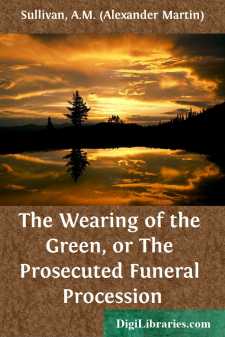Categories
- Antiques & Collectibles 13
- Architecture 36
- Art 48
- Bibles 22
- Biography & Autobiography 813
- Body, Mind & Spirit 142
- Business & Economics 28
- Children's Books 15
- Children's Fiction 12
- Computers 4
- Cooking 94
- Crafts & Hobbies 4
- Drama 346
- Education 46
- Family & Relationships 57
- Fiction 11828
- Games 19
- Gardening 17
- Health & Fitness 34
- History 1377
- House & Home 1
- Humor 147
- Juvenile Fiction 1873
- Juvenile Nonfiction 202
- Language Arts & Disciplines 88
- Law 16
- Literary Collections 686
- Literary Criticism 179
- Mathematics 13
- Medical 41
- Music 40
- Nature 179
- Non-Classifiable 1768
- Performing Arts 7
- Periodicals 1453
- Philosophy 64
- Photography 2
- Poetry 896
- Political Science 203
- Psychology 42
- Reference 154
- Religion 513
- Science 126
- Self-Help 84
- Social Science 81
- Sports & Recreation 34
- Study Aids 3
- Technology & Engineering 59
- Transportation 23
- Travel 463
- True Crime 29
The Wearing of the Green, or The Prosecuted Funeral Procession
Description:
Excerpt
THE PROSECUTED FUNERAL PROCESSION.
The news of the Manchester executions on the morning of Saturday, 23rd November, 1867, fell upon Ireland with sudden and dismal disillusion.
In time to come, when the generation now living shall have passed away, men will probably find it difficult to fully realize or understand the state of stupor and amazement which ensued in this country on the first tidings of that event; seeing, as it may be said, that the victims had lain for weeks under sentence of death, to be executed on this date. Yet surprise indubitably was the first and most overpowering emotion; for, in truth, no one up to that hour had really credited that England would take the lives of those three men on a verdict already publicly admitted and proclaimed to have been a blunder. Now, however, came the news that all was over—that the deed was done—and soon there was seen such an upheaving of national emotion as had not been witnessed in Ireland for a century. The public conscience, utterly shocked, revolted against the dreadful act perpetrated in the outraged name of justice. A great billow of grief rose and surged from end to end of the land. Political distinctions disappeared or were forgotten. The Manchester Victims—the Manchester Martyrs, they were already called—belonged to the Fenian organization; a conspiracy which the wisest and truest patriots of Ireland had condemned and resisted; yet men who had been prominent in withstanding, on national grounds, that hopeless and disastrous scheme—priests and laymen—were now amongst the foremost and the boldest in denouncing at every peril the savage act of vengeance perpetrated at Manchester. The Catholic clergy were the first to give articulate expression to the national emotion. The executions took place on Saturday; before night the telegraph had spread the news through the island; and on the next morning, being Sunday, from a thousand altars the sad event was announced to the assembled worshippers, and prayers were publicly offered for the souls of the victims. When the news was announced, a moan of sorrowful surprise burst from the congregation, followed by the wailing and sobbing of women; and when the priest, his own voice broken with emotion, asked all to join with him in praying the Merciful God to grant those young victims a place beside His throne, the assemblage with one voice responded, praying and weeping aloud!
The manner in which the national feeling was demonstrated on this occasion was one peculiarly characteristic of a nation in which the sentiments of religion and patriotism are so closely blended. No stormy "indignation meetings" were held; no tumult, no violence, no cries for vengeance arose. In all probability—nay, to a certainty—all this would have happened, and these ebullitions of popular passion would have been heard, had the victims not passed into eternity. But now, they were gone where prayer alone could follow; and in the presence of this solemn fact the religious sentiment overbore all others with the Irish people....


